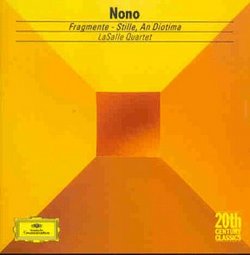| All Artists: Luig Nono, LaSalle Quartet Title: Nono: Fragmente - Stille, an Diotima Members Wishing: 0 Total Copies: 0 Label: Deutsche Grammophon Release Date: 9/7/1993 Genre: Classical Style: Chamber Music Number of Discs: 1 SwapaCD Credits: 1 UPC: 028943772020 |
Search - Luig Nono, LaSalle Quartet :: Nono: Fragmente - Stille, an Diotima
CD Details |
CD ReviewsA repository for the ugly beauty of the century scarecrow | Chicago, Illinois United States | 11/09/2003 (5 out of 5 stars) "It was the La Salle Quartet who had commissioned a quartet from the young Luigi Nono returning to the late Fifties. Nono,who espoused Marxist beliefs had no imagination for a self-contained elitist genre as the string quartet. His imagination was in finding conceptual equivalents with political texts, as Marx,Che Guevara,Lenin, Louise Michel, The Paris Commune, the terror bombing of Hiroshima, The Algerian Conflict of the early Sixties, Vietnam and Chile of 1973. This quartet had to wait until 1980, when it was premiered by LaSalle at The Beethoven Bonn Festival. It shocked many. Here everyone thought Nono had abandoned his lifework, of musical dramatic subversion,of his impacted stridently fused,wrenched cluster chords, as in his operas, "Intolleranza" or "like a burgeoning light of love" writing timbres under the primary signs of Marxism. But this is a quartet that has struggle, subversion, anger, reflections, feelings for what could have been for the 20th Century, for those murdered in the name of what? As if all the violence had no meaning and that we have lost our sense of hearing, that we can longer hear music in an administered world, simply timbres, fragments of timbres, shard and splinters of timbre, string pizzicati, arco, Am Steg, at the bridge,tremoli,pencil-thin harmonics, sul ponticello.Despite all that, this is an incredibly beautiful quartet, Nono's only contribution to the genre. It has feathery light moments, introspective, private. The players are required to recite(not outloud, but to themselves) excerpts from the poetry of Holderlin, another subversive from the Romantic era, a place Nono often sought refuse, recluse, from the horrors of the 20th Century. The LaSalle are not quite as adventuresome, nor risk taking as you may encounter with the Arditti Quartet, who function more as four distinguishable soloists, yet passive in their role of placing the dimensions of the durational schemes of the music first. LaSalle tries to complete,formulate predictability at times or round out to make sense of Nono's irrational timbral designs, for they do comprehend the work's threadbare shapes, and abandoned demeanor, that something has ended, and we, the composer perhaps, need to begin again,Helmut Lachenmann did say that timbre does need to be renewed at some frequent intervals if modernity should persist, or the expression of music.This quartet works best with this edge of being lost, It is not intended to be made complete in parts conceptually. Something, again Arditti seems to understand, despite there often times exchange-value based interpretations. Although then Arditti can be cold in feeling, even for the most abstract wistful moments of modernist repertoire,And for no real aesthetic purpose, simply cold without intention, like they are lossed in a philosophic abyss, on some abandoned island, which was the language of modernity. La Salle you sense their age a bit more, more predictable playing, afraid to make noises, or play an ugly sound."
|

